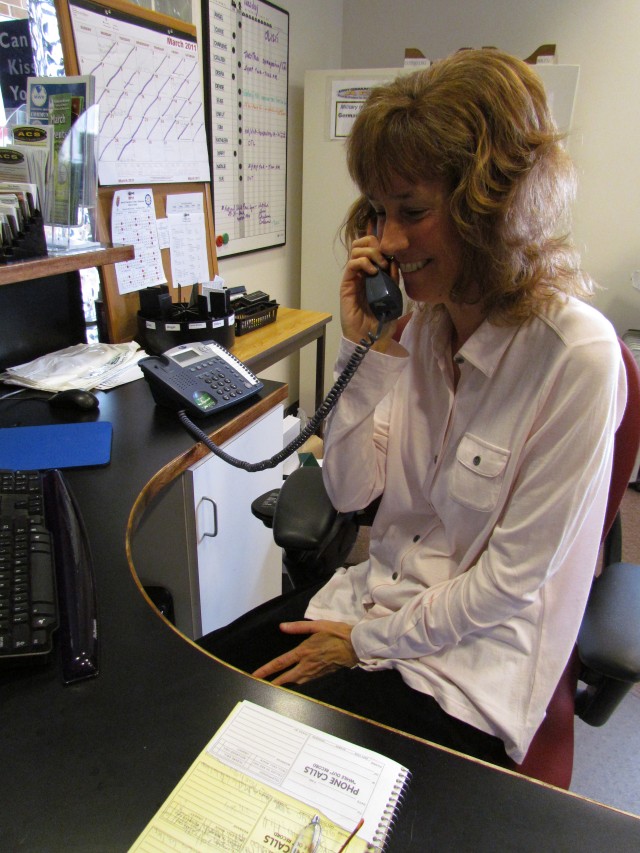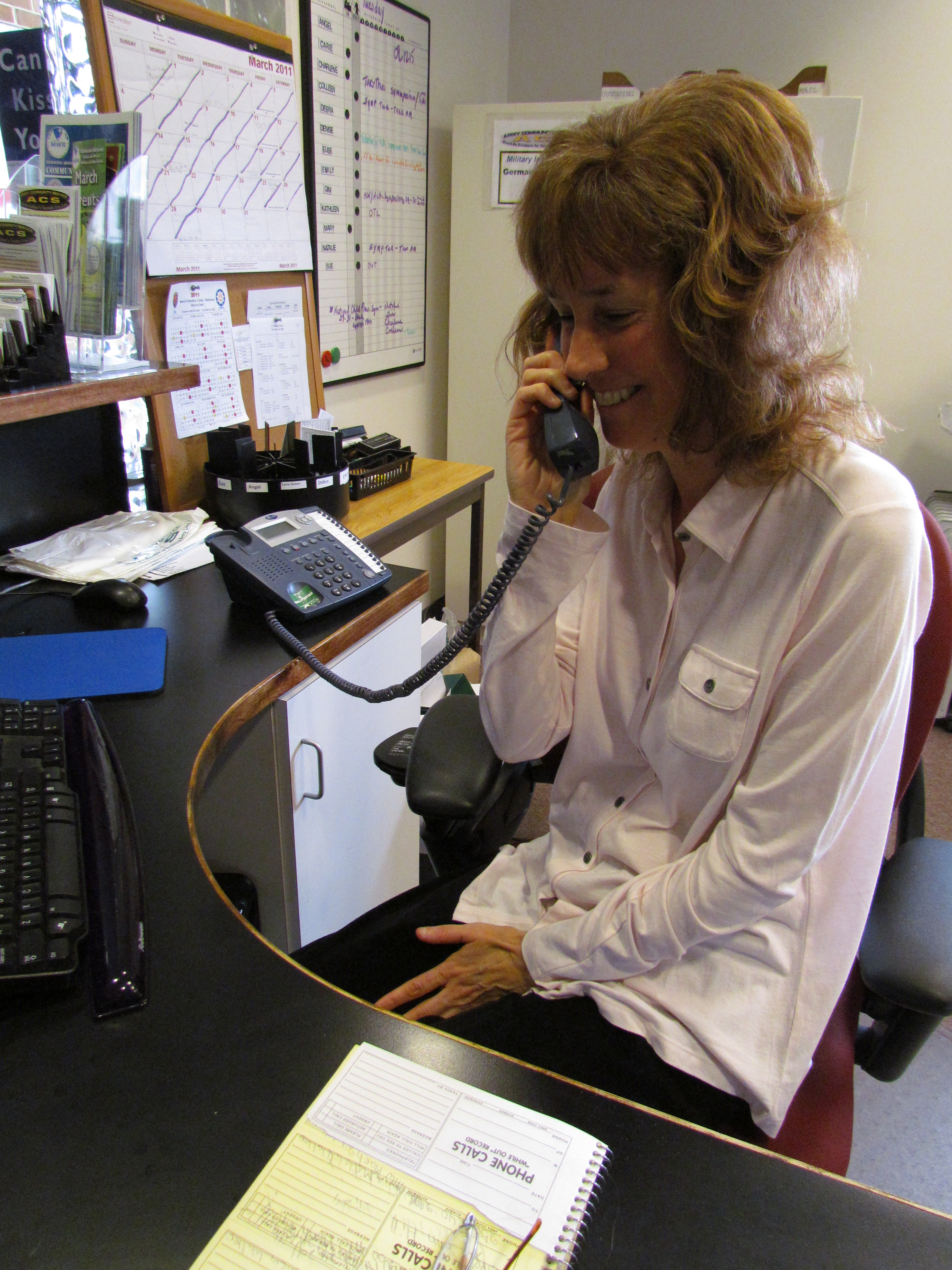REDSTONE ARSENAL, Ala.--Traveling and adventure mixed with parental absences and changes in residence define the life of a military-connected child.
Growing up military is about living with the good and the bad of life, much like that with any child. The difference, though, in a military family is that the family's right to choose its own destiny, its own path through life, must be sacrificed to the will of the Army and its Soldier needs. And the military-connected child runs a greater risk of losing a beloved family member.
For Malicia Walters, giving up the right to choose where they would live was a sacrifice her family was willing to make in exchange for a Soldier dad who had a satisfying and interesting military career, the chance to visit relatives across the ocean and the security of knowing the family had a stable income.
"It was a great way of life for us," said Walters, who now volunteers at Army Community Service.
"My dad came from a very small farming community in North Carolina and he had no college. But his Army career took him around the world and he loved every minute of it. It gave him a life he wouldn't have had if he didn't join the Army."
Walters was born in 1962 on an Air Force base in Abilene, Texas. His brother, Jeff, was two years older. Their mom, Betty, from Vienna, Austria, met and married their dad while he was stationed in Germany.
"My dad (retired Chief Warrant Officer 4 Jarvis Wilson) was 18 when he joined the military. It was a way for him to get out of his surroundings. He had seen from his uncle that it was a good life," Walters said. "It was always a steady paycheck, a nice home, a stable environment and a good fit for our whole family. We lived in Germany, and got to visit our relations there. We camped out all through Europe. We were an international family because of the Army."
Walters' family also saw their North Carolina relations on a regular basis, visiting between their dad's assignments or on vacations.
But the moves to different assignments did create a dynamic in their family that "more grounded" civilian families don't experience."
"You don't really have a permanent home because you are always moving," Walters said. "You don't really have close friends that you've known a long time. And many times, you miss out on things with your extended family. There's a closeness with your extended family - your aunts and uncles, your cousins and your grandparents - that you don't have because you are far away."
Because of her dad's work in missile defense, Walters spent half of her growing up years in Germany. She enjoyed those tours because she and her brother and mother got to spend time with her mother's family. Her dad's tours stateside took the family to Fort Bliss, Texas.
"We went to Germany as many times as possible," Walters said. "We all loved it over there. I was very fortunate with my dad that I got to see part of the world, basically Europe. When you move around a lot, you get to meet other people and you are exposed to different backgrounds and different ways of life. You get to meet very interesting people."
In Germany, Walters and her brother attended Department of Defense schools, which, at the time, were fairly small in their number of students. "We went to school with other military kids, and we liked that," she said.
When at Fort Bliss, there were times when Walters' dad went on assignments that took him away from his family. He also spent a year in service in Korea.
"My mom did have to raise us on her own, just like other military wives and mothers. But all the changes and moves of military life can make you a more outgoing person, and it can make you more flexible and independent," Walters said. "You learn to adapt to different situations in life."
Walters' dad never went to war, so the family didn't have to endure the worry and stress that deployed Soldiers and their families are living through today.
In 1974, Walters' dad retired after 30 years of service, taking the family back to his hometown in North Carolina. That experience created challenges for her family that they hadn't expected.
"It was very hard to adjust to the civilian way of life," Walters said. "You think you can go back home, but you can't. My dad couldn't find a job.
"High school was really hard. My brother and I had gone to school mostly with military kids, and in North Carolina there were no military kids around. It was strictly civilian and the kids had lived there their whole lives. I had the worst time fitting in."
The family also missed the support system offered by the Army and Army Community Service. "You just don't have that in the civilian community," she said.
Walters graduated from high school in 1977 and, in the early '80s, her dad became a civil service employee assigned overseas to Germany. Walters joined her parents in the move back to Germany and took a job with Army Community Service, eventually meeting and marrying an Army lieutenant who also happened to be from North Carolina.
"Staying connected to the military was what I knew. It was what I was familiar with," Walters said. "The Army has a tendency to take care of its people. After awhile it does become a small family."
Walters agrees that multiple deployments have made it harder for today's military families to cope with military life. She works at ACS with one staff member - quality of life program manager Carie Green - who knows all too well the price paid by military families whose Soldier deploys.
"The hardest experience for a military family is seeing their Soldier deploy," Green said. "When my husband deployed to Afghanistan, I saw how much it affected our oldest son."
At the time, Savaughn was 5. Their second child, Shaun, was nearly 2. And Green was pregnant with their youngest, Sydney. Green was herself a Soldier stationed in Germany when she met her husband, Sgt. 1st Class Lance Green, who now works in the AMCOM/Garrison Equal Opportunity Office. Her own service helped Green to be strong while her husband deployed.
"During his deployment, I watched the news more. Savaughn would ask me 'Is daddy fighting the bad guys'' He wanted to know what was going on," Green said.
Before the deployment, Green's husband taught Savaughn how to take care of himself.
"He taught him how to take a bath by himself, how to button his shirt, and how to take care of himself. With one not yet two and the other one on the way, Lance knew I would need all the help I could get," Green said.
"Savaughn stepped up. He would take the trash out. Daddy taught him before he left how to take care of mommy. He learned to use the microwave. He grew up fast. He still helps a lot with his brother and sister."
Green's husband still travels with his work. And sometimes, that shows in her children's behavior.
"One day, Shaun (now 5) acted up in class. The teacher said she was going to call his dad. Instead of backing down, he told the teacher 'My dad's not home. He's TDY,'" Green said.
"When Shaun was 2, his dad went to Korea for six months. When he came back, Shaun screamed 'Daddy! Daddy!' and started to cry. Our daughter didn't remember her daddy and she didn't really want to talk to him. She'd peek around the corner to see him. But, now they are inseparable."
Green's husband makes up for his absences by spending a lot of quality time with their three children when he is home. The kids thoroughly enjoy their father and want to do everything with him. Their daughter, now 3, insists on getting a haircut with her daddy. "She is close to him and doesn't want to be left out," Green said.
Green, who didn't grow up in the military, has seen how military life has affected her children.
"The kids are more mature, more helpful and more resilient," she said. "The have a better understanding of change and are more well-rounded. They are used to meeting different people and they have experienced much more diversity."
Even so, Green is hoping her husband will choose to retire this fall after 20 years in the Army.
"His tour in Afghanistan was extended from 12 to 15 months. I learned about that by watching CNN," Green recalled. "If Lance stays in, he will get a new assignment and he will be deployed again. We love it here at Redstone. My friends here are my family. We don't want to leave."
Even though Walters grew up military, her daughter did not. Walters and her Soldier husband divorced in the early years of their marriage and Walters moved to Huntsville, where her dad was working as a civil servant in missile defense at Redstone. Walters raised the couple's daughter, Kelly, in Huntsville.
"I can see the benefits of her growing up in one place. She has the benefits of friends compared to what I had. I can see the advantages of her staying in one place," she said.
Kelly is now in her third year at Auburn University, where she is majoring in German. She hopes to eventually move to Germany and teach in German schools. When Kelly went to college, Walters decided it was time to reconnect on her own with the Army.
"I missed working with Soldiers, and I missed seeing the uniform and working with people in the military," Walters said. "So, I volunteered with ACS. Most of the people here are prior military. It's like a little family.
"I like the atmosphere. I like working with Soldiers, and helping Soldiers and their families. ACS at Redstone is a great place to work and we have a great director in Sue Paddock."
No matter the challenges of growing up in a military family, Walters is thankful it has been part of her life.
"Even though the military can be a hard way of life, I find that it is a special way of life," Walters said. "In the military, you always have a common thread that helps you make friends quickly and easily. When you have been a military kid, you can relate to other people who have been in the military.
"It's a wonderful life and you meet some great people through it."


Social Sharing